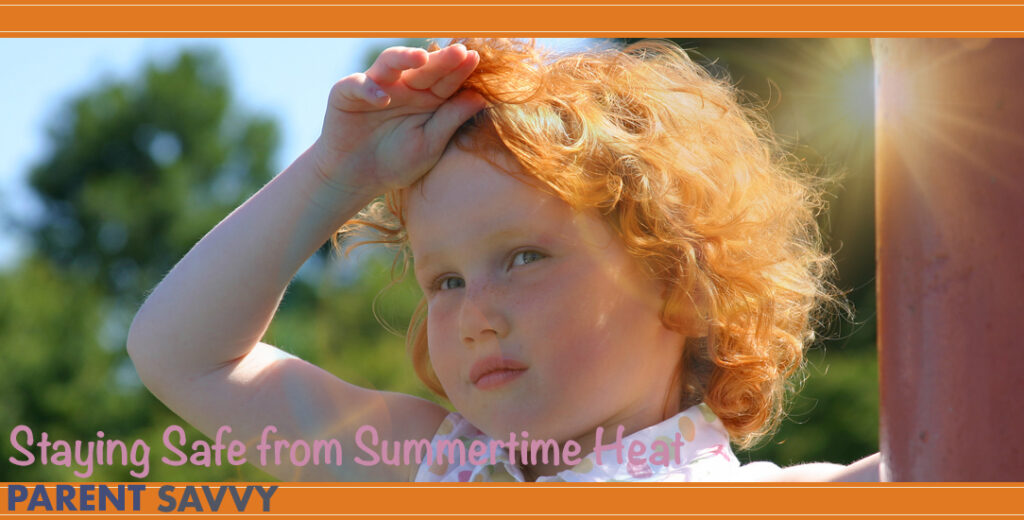Summertime brings a lot of recreation and outdoor fun for children, but beware of the summertime heat

It also brings potential risk of heat exhaustion and a number of other heat-related illnesses.
The good news is heat-related medical cases can be avoided with a few simple suggestions:
- Do not leave children in a parked car, even with windows open. Temperatures can soar to over 120 degrees in minutes. Open windows do not provide enough ventilation to protect children from heat.
- Hydrate. If your child is playing outside, they should drink a glass of water every hour. Children lose electrolytes and minerals when they perspire — sports drink to help restore balance. Be advised, however, that sports drinks should not replace water. Avoid caffeinated and sugary drinks.
- Avoid outside play during the hottest time of the day. Play outdoors in the morning or late afternoon/early evening. Avoid the hottest part of the day between the hours of 2 to 4 p.m.
- Use sunscreen even if it’s cloudy out. Children should wear at least an SPF 30 sunscreen. Re-apply when children take a water break — about every hour. Avoiding sunburns will also help mitigate heat-related illnesses.
- Use common sense. If there are heat advisories, or if your children don’t do well in the heat, avoid going outside. Instead, spend the day at a museum or at an indoor play area. Save outdoor activities for the evening.
As a parent, you know what’s best for your child. If you think your child has been outdoors enough and is at risk of overexposure to summertime heat, make the call to move playtime inside. And if your child is displaying any signs or symptoms of heat-related illnesses, contact your pediatrician.
I’ve included a list of warning signs and what to do for heat-related illnesses compiled by the Centers for Disease Control for reference.
Heat-Related Illnesses
There are a few types of heat-related illnesses that can affect both children and adults. Below is a list of what to look for and what you can do in the event of one of a heat related illness:
Heat Stroke
- What to look for:
- High body temperature (103°F or higher)
- Hot, red, dry, or damp skin
- Fast, strong pulse
- Headache
- Dizziness
- Nausea
- Confusion
- Losing consciousness (passing out)
- What to do:
- Call 911 right away-heat stroke is a medical emergency
- Move your child to a cooler place
- Help lower your child’s temperature with cool cloths or a cool bath
- Do not give you child anything to drink
Heat Exhaustion
- What to look for:
- Heavy sweating
- Cold, pale, and clammy skin
- Fast, weak pulse
- Nausea or vomiting
- Muscle cramps
- Tiredness or weakness
- Dizziness
- Headache
- Fainting (passing out)
- What to do:
- Move your child to a cool place
- Loosen your child’s clothes
- Put cool, wet cloths on your child’s body or give them a cool bath
- Have you child sip water
- Seek medical help right away if:
- Your child is throwing up
- Your child’s symptoms get worse
- Your child’s symptoms last longer than 1 hour
Heat Cramps
- What to look for:
- Heavy sweating during intense exercise
- Muscle pain or spasms
- What to do:
- Stop physical activity and move your child to a cool place
- Have you child drink water or a sports drink
- Wait for the cramps to go away before having your child do any physical activity
- Seek medical help right away if:
- Cramps last longer than 1 hour
- You’re child is on a low-sodium diet
- Your child has heart heart problems
Sunburn
- What to look for:
- Painful, red, and warm skin
- Blisters on the skin
- What to do:
- Stay out of the sun until your child’s sunburn heals
- Put cool cloths on sunburned areas or give you child a cool bath
- Put moisturizing lotion on sunburned areas
- Do not break blisters
Heat Rash
- What to look for:
- Red clusters of small blisters that look like pimples on the skin (usually on the neck, chest, groin or in elbow creases)
- What to do:
- Stay in a cool, dry place
- Keep your child’s rash dry
- Use powder (like baby powder) to soothe the rash
Stay mindful of the summertime heat. If you are still unsure of what to do in the event of a heat-related illness, seek medical help immediately.
